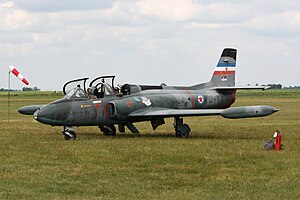Soko G-2
| G-2 Galeb | |
|---|---|
 |
|
| Role | Jet trainer and ground-attack |
| National origin | Socialist Federal Republic of Yugoslavia |
| Manufacturer | SOKO |
| First flight | 3 July 1961 |
| Status | Limited service |
| Primary user | Yugoslav Air Force |
| Produced | 1965–1983 |
| Number built | 248 |
| Unit cost |
$150,000 (1968)
|
| Variants | J-21 Jastreb |
The Soko G-2 Galeb (English: Seagull) is a Yugoslav single engine, two-seater jet trainer and light ground-attack aircraft. The G-2 was developed during the 1950s by the Aeronautical Technical Institute at Žarkovo as a replacement for the Lockheed T-33 in service with the Yugoslav Air Force (Serbo-Croatian: Ratno vazduhoplovstvo i protivvazdušna odbrana – RV i PVO). Production started in 1965 at the Soko aircraft factory in Mostar, and ended in 1985 with 248 aircraft delivered. The G-2 had the distinction of being the first mass-produced jet aircraft in socialist Yugoslavia. It also served as a basis for the single-seat ground-attack J-21 Jastreb.
The RV i PVO took delivery of 128 aircraft that were used by the Air Force Academy for training new pilots. The second largest operator of the Galeb was Libya, which acquired over 100 aircraft during the 1970s. A small number were also acquired by Zaire, Zambia and Indonesia. During the breakup of Yugoslavia, the Galebs were used for ground attack sorties throughout Croatia and Bosnia and Herzegovina. By 1992, RV i PVO G-2s relocated to Serbia and Montenegro where they operated with the Air Force of the new FR Yugoslavia. The aircraft remained in service until 1999 when the majority of them were destroyed on ground during the NATO bombing of Yugoslavia.
...
Wikipedia
